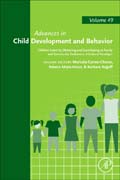
Children Learn by Observing and Contributing to Family and Community Endeavors: A Cultural Paradigm
Correa-Chávez, Maricela
Rogoff, Barbara
Mejia-Arauz, Rebeca
Children Learn by Observing and Contributing to Family and Community Endeavors, the latest in the Advances in Child Development and Behavior Series provides a major step forward in highlighting patterns and variability in the normative development of the everyday lives of children, expanding beyond the usual research populations that have extensive Western schooling in common. The book documents the organization of children's learning and social lives, especially among children whose families have historical roots in the Americas (North, Central, and South), where children traditionally are included and contribute to the activities of their families and communities, and where Western schooling is a recent foreign influence. The findings and theoretical arguments highlight a coherent picture of the importance of the development of children's participation in ongoing activity as presented by authors with extensive experience living and working in such communities. Contains contributions from leading authorities in the field of child development and behaviorPresents a coherent picture of the importance of the development of children's participation in ongoing activity Provides a major step forward in highlighting patterns and variability in the normative development of the everyday lives of children, expanding beyond the usual research populations that have extensive Western schooling in commonInforms and updates on all the latest developments in the field INDICE: 1. Introduction: Paradigms in the Arrangement of Learning Barbara Rogoff, Maricela Correa-Chavez and Rebeca Mejía-Arauz AN EXAMPLE: CHILDREN AS PARTICIPANTS IN COMMUNITY2. Children's Learning about Cultural Meanings of Death through Observing and Pitching In Isabel Gutierrez, Karl Rosengren and Peggy Miller INITIATIVE AND CONTRIBUTIONS TO WORK IN MIDDLE CHILDHOOD3. Children´s learning through collaboration at home and in community endeavors Rebeca Mejía-Arauz, Maricela Correa-Chavez and Ulrike Keyser 4. Appreciating Family Contribution or Paying Children for Chores: Cultural Differences in Encouraging Children's Help Lucia Alcala and Andrew Coppens 5. The Central Role of Observing and Accomplishing Work in Children's Learning in an Indigenous Mexican Community Rafael CardosoYOUNG CHILDREN'S AGENCY AND ADULT ACCOMMODATION6. Concentration in Observing Adults' Activities and Respectful Initiative Fernando Garcia7. Adults' Adjustments [or Orientation] and 2-year-old Children's Initiative in Contributing to Adults' Everyday Activities in a Tsotsil Maya Community Margarita Martínez Pérez8. Children's Attempts to Engage in Everyday Activities Create Learning Ecologies with Adults in a Zinacantec Mayan Community Lourdes de LeónCONCEPTIONS AND PRACTICES OF CONSIDERATENESS AND RESPONSIBILITY FOR OTHERS 9. Conception of Educational Practices among the Nahuas of Mexico: Past and Present Marie-Noëlle Chamoux10. Dynamic Arrangements for Considerate Collaboration in Indigenous-Heritage Communities Over Historical Time Ruben Flores, Luis Urrieta Jr. and Angelica López 11. Everyday Learning to Assume Responsibility for Others in a Nahua Community David Lorente FernándezEXPANDING LOPI : OTHER COMMUNITIES AND OTHER KNOWLEDGE SYSTEMS12. Children participation in ceremonial life in Bali, Extending LOPI to other parts of the world Yolanda Corona13. Indigenous Children's Relational Thinking About Nature and Learning by Observing and Pitching In Megan Bang, Ananda Marin and Douglas Medin 14. LOPI and the Connections to Indigenous Knowledge Systems Luis Urrieta Jr.
- ISBN: 978-0-12-803121-6
- Editorial: Academic Press
- Encuadernacion: Cartoné
- Páginas: 344
- Fecha Publicación: 01/12/2015
- Nº Volúmenes: 1
- Idioma: Inglés
